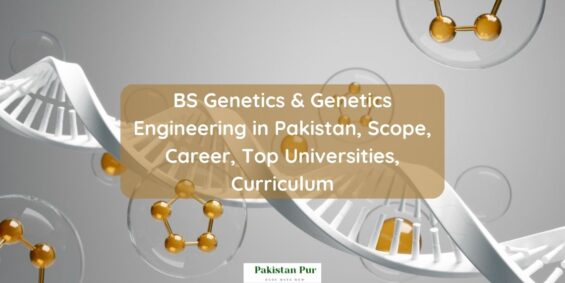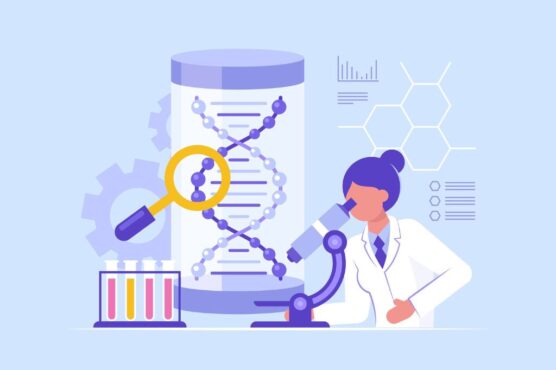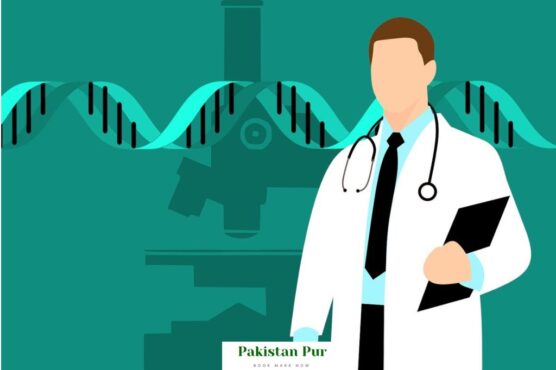
Welcome! So you’re here to gather some knowledge about genetics. Wanna know how to pursue a degree in genetics and genetic engineering? Well you’re at the right place. In this blog we’ll discover the subjects and fee structure of the top universities offering a BS degree in genetics. Get on reading and by the end you’ll have known almost everything you need to know about a BS in genetics.
Table of Contents
This Ultimate Guide to BS Genetics in Pakistan is a part of the series on the best degrees after FSc pre medical. Read our full article here.
Best Degrees after FSc Pre Medical in Pakistan
BS Genetic Engineering All Universities Pakistan
Here is a list of all the universities offering BS Genetics and BS Genetic Engineering in Pakistan.
| Institution | City | Program | Private / Public |
|---|---|---|---|
| University Of Sindh | Jamshoro | BS , 4 Years | Public |
| University Of Karachi | Karachi | BS , 4 Years | Public |
| Kinnaird College For Women | Lahore | BS , 4 Years | Public |
| Shaheed Benazir Bhutto University, Nawab Shah | Nawab Shah | BS , 4 Years | Public |
| University Of Okara | Okara | BS , 4 Years | Public |
| University Of Swat | Swat | BS , 4 Years | Public |
| Sohail University | Karachi | BS , 4 Years | Private |
| National University Of Medical Sciences | Rawalpindi | BS , 4 Years | Public |
| University Of Health Sciences, Kala Shah Kaku Campus | Lahore | BS , 4 Years | Public |

BS Genetics Subjects in Pakistan
The curriculum for a BS Genetics program in Pakistan typically spans over four years and provides students with a solid foundation in the field of genetics. The courses are comprehensive, encompassing both theoretical and practical aspects of genetics.
Core Courses
The core curriculum typically includes the following subjects:
- Cell Biology: As the name suggests, cell biology is the study of the components and biology of the cell. In this course you’ll be given an understanding of the cell structure and function. Isn’t that the part where genes are!
- Molecular Biology: Molecular biology includes the study of molecules that make up the structure of the cell and are essential for its function.In this course you’ll get to explore the molecular mechanisms that control the function of cells.
- Microbiology: Microbiology refers to the study of various microorganisms and their effect on humans.In this course you’ll get to study about the microorganisms and their effect on humans. Did you know! Our body has bacteria called Natural Flora that make up 1%-3% of our total body mass.
- Biochemistry: It’s a laboratory-based science that combines chemistry and biology to study the structure, composition, and chemical reactions of substances in living systems. In this course you’ll deal with the chemical processes within and related to living organisms.
- Genetics: Here’s your main subject, in this course you’ll focus on the science of heredity and variation in living organisms.
- Biotechnology: Biotechnology uses living organisms to solve problems, such as in agriculture, environmental remediation, and disease treatment. It Includes traditional breeding techniques and modern lab-based methods.This course will introduce you to the use of living systems and organisms to develop or make products.
- Genomics: In this course you’ll be provided with an understanding of the structure.
Read this guide to know about the scope of BS Genetics in Pakistan.
Scope Of BS Genetics In Pakistan
BS Genetics Curriculum HEC
Here is the BS Genetics curriculum from HEC.
BS Genetics Curriculum: 1st Semester
- English – I
- Cell Biology
- Mathematics – I
- introduction to Computing
- Elective –I**
- Elective – II**
BS Genetics Curriculum: 2nd Semester
- English – II
- Principles of Genetics
- Mathematics – II
- 1 course of Social Sci.*
- Elective –I**
- Elective –II**
BS Genetics Curriculum: 3rd Semester
- English – III
- Cytogenetics
- Principles of Biochemistry
- Pakistan Studies
- Elective –I**
- Elective –II**
BS Genetics Curriculum: 4th Semester
- English (Communication Skills)
- Molecular Biology
- Biometry – I
- Islamic Studies/Ethics
- Elective-I**
- Elective-II**
BS Genetics Curriculum: 5th Semester
- Genetics and Evolution
- Molecular Genetics
- Microbial Genetics
- Population Genetics
- Principles of Breeding
BS Genetics Curriculum: 6th Semester
- Physiological Genetics
- Genetic Engineering
- Human Genetics
- Biometry – II
- Bioinformatics
BS Genetics Curriculum: 7th Semester
- Biosafety and Bioethics
- Developmental Genetics
- Biotechnology
- Research Techniques
- Genomics and Proteomics
- Seminar-I/Report Writing
BS Genetics Curriculum: 8th Semester
- Immunogenetics
- Genetic Resources and Conservation
- Seminar-II
- Special Paper-I
- Special Paper II,
Or
- Special Paper
- internship
Or
- Research

Admission Criteria for BS Genetics & BS Genetics Engineering
Admission criteria for BS Genetics and BS Genetics Engineering programs in Pakistan may vary based on the institution, but the following are some common requirements that students typically need to meet:
For BS Genetics:
- Pre-medical/A-levels or equivalent with at least 60% marks.
- NAT (General)/ MDCAT with a minimum of 50% of cumulative score OR NUMS Admission Test.
- Some universities may require an entrance exam.
- A minimum of 130 credits is required to complete the Bachelor of Science in Genetics.
For BS Genetics Engineering:
- Students need to pass FSc pre-medical or pre-engineering with at least 60% marks.
- They also have to pass a combined entry test.
Please note that these are general guidelines, and specific admission criteria may vary from one institution to another. It’s always a good idea to check with the specific university or college for their detailed admission requirements.
Read this guide to know about BS Microbiology and Molecular Genetics Scope in Pakistan.
BS Microbiology And Molecular Genetics Scope In Pakistan
BS Genetics Universities in Pakistani Cities
BS Genetics in Lahore
These universities are offering BS genetics in Lahore.
- Kinnaird College For Women, Lahore
- University Of Health Sciences, Kala Shah Kaku Campus, Lahore
BS Genetic Engineering in Karachi
These universities offer BS genetic engineering in Karachi.
- Sohail University, Karachi
- University Of Karachi
BS Genetic Engineering in Islamabad / Universities in Rawalpindi for Bs Genetics
These universities offer BS genetics in Islamabad and Rawalpindi.
- National University Of Medical Sciences, Rawalpindi
Biotechnology Vs Genetic Engineering
Biotechnology and Genetic Engineering are two concepts that often appear together in the scope of modern science. While they are closely related, they are not the same thing. Let’s dive into their differences and how they interact with each other.
Biotechnology
Biotechnology is a broad field that merges biology with technology. It involves the exploitation of biological processes for industrial and other purposes, especially the genetic manipulation of microorganisms for the production of antibiotics, hormones, etc. This can include everything from brewing beer using yeast (a centuries-old practice) to creating new medicines.
Modern biotechnology today includes the tools of genetic engineering but is not limited to them. It covers a range of technologies used to change the genetic makeup of cells, including the transfer of genes within and across species boundaries to produce improved or novel organisms.
Genetic Engineering
Genetic Engineering, on the other hand, is a subset of biotechnology. It refers specifically to the direct manipulation of an organism’s genes using biotechnology. Genetic engineering alters the genetic structure in organisms to produce improved or novel organisms. An example would be modifying the DNA of bacteria to produce human insulin.
In essence, genetic engineering applies engineering principles to biological systems to solve problems. It’s a more targeted and precise method of manipulating an organism’s genetic makeup, as opposed to traditional methods like selective breeding.
While genetic engineering is a type of biotechnology, not all biotechnology involves genetic engineering. Both fields, however, have significantly contributed to advancements in sectors such as medicine, agriculture, and environmental science.
Leave a Reply